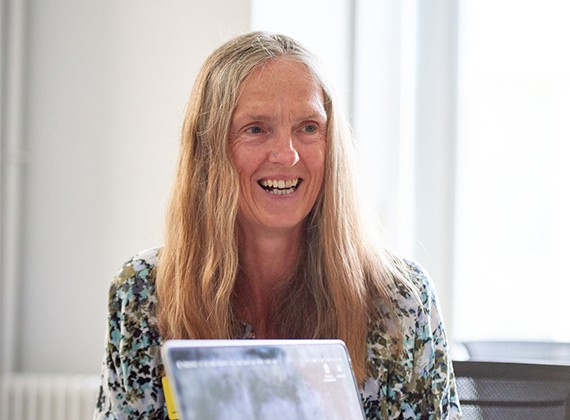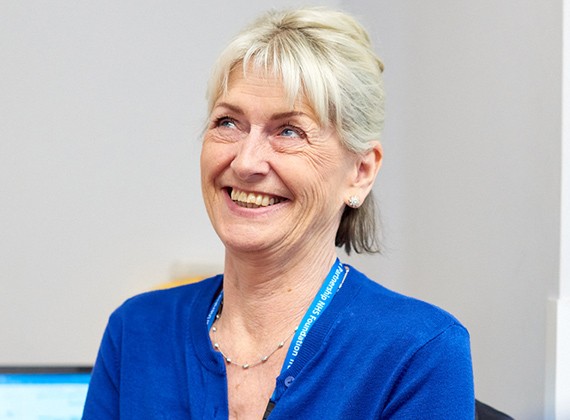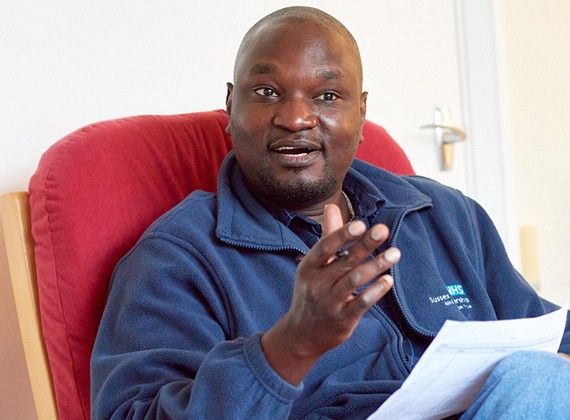

Post-Traumatic Stress Disorder Clinic
The PTSD research clinic spans primary and secondary care, to improve outcomes for people with post-traumatic stress disorder (PTSD), by increasing access to evidence-informed treatments, and supporting researchers to learn what treatments work for whom.
It is led by Dr Nick Grey, Consultant Clinical Psychologist and Associate Director of Psychological Professions.
The clinic does NOT accept referrals and it does not offer treatments itself. The clinic is embedded in established Sussex Partnership Foundation Trust (SPFT) services, where it evaluates the treatments offered for those with PTSD and Complex PTSD (C-PTSD).
This page is separated into three sections for ease of reading. These sections are: About the Clinic, Info on PTSD and Complex PTSD, and Local Support.
1. About the Clinic
We are looking at the outcomes of Eye Movement Desensitisation and Reprocessing (EMDR) and trauma-focused Cognitive Behavioural Therapy (tf-CBT), the evidence-based psychological therapies for PTSD. There are not clear guidelines currently regarding who should be offered which treatment. We will also look at the impact of face-to-face vs remote delivery. This is using existing routinely collected data.
PTSD National Institute for Health and Care Excellence Guidelines
This project will seek to increase the offer of Compassionate Resilience groups (CRG) for people who meet criteria for Complex PTSD. CRG is an evidence-informed psychological therapy provided by appropriately trained registered practitioners. Initial evaluations of this treatment have been conducted by the Berkshire Trauma Service, led by Dr Deborah Lee, Consultant Clinical Psychologist, the developer of CRG.
Compassionate Resilience derives from the Compassion Focused Therapy (CFT) approach, initially developed to treat shame, self-loathing, and self-criticism. CFT is useful to treat different conditions such as anxiety, depression, psychosis and trauma. The goal of CFT is to alleviate your own suffering by developing your own care-giving (compassion) system, which includes developing non-judgement, warmth, kindness, wisdom, empathy and moral courage.
PTSD clinic does NOT accept referrals as it is a research clinic embedded in SPFT services. However, if you are interested in CRG and would like to know where you can access it through the NHS, there are a number of practitioners trained in CFT within Neighbourhood Mental Health Teams (NMHTs) across West and East Sussex (but not in Brighton and Hove). They may offer you a place in a CRG, after carrying out a suitability assessment and provided that you meet criteria of PTSD/ complex PTSD. The groups are run online, and there are trained practitioners in NMHTs within the following localities: North West Sussex, Eastbourne, High Weald, Lewes, and Havens, Hastings and Rother. Your GP can refer you into your local NMHT, but only if you live in the areas listed would you be able to access the CRGs.
Useful links & material about Compassion-focussed therapy and Compassionate Resilience:
Introducing compassion-focused therapy | Advances in Psychiatric Treatment | Cambridge Core
Developing Compassionate Resilience (Good practice points from Health Education England)
An Introduction to Concepts and Compassion-Focused Exercises (Paul Gilbert)
Compassionate Resilience PTSD Groups poster scoops prize at International Conference
Our poster about Compassionate Resilience Groups in secondary care adult mental health services, won second prize at the 13th International Compassion Focussed Therapy (CFT) Conference in October 24. The findings highlight the effectiveness and acceptability of Compassionate Resilience group therapy for people with PTSD. View the poster.
The Lived Experience Advisory Panel (LEAP) for the PTSD clinic is a group of people with experience of PTSD who are actively involved and/or support the work of the clinic. The LEAP for PTSD is led by Chloë Elsby-Pearson.
The group meet periodically to help clinicians and researchers improve the quality and accessibility of services and support available for PTSD, and to develop new research about PTSD.
If you are interested in joining our LEAP or would like to find out more about how to get involved in research for PTSD, please email: spft.
2. Info on PTSD
Post-traumatic stress disorder (PTSD) is caused by distressing and extremely frightening events. There are three groups of problems in PTSD:
're-experiencing' of the memories through flashbacks or nightmares; avoidance of feelings, thoughts (internal avoidance) and people, places etc that act as reminders of the events (external avoidance); and 'hyperarousal', such as being especially alert and/or being very jumpy.
It is common for people with PTSD to experience feelings of isolation, guilt, shame and anger. PTSD can also impact your sleep and concentration throughout day-to-day activities. PTSD symptoms are often severe and persistent, causing a significant impact on the person's life.
It is common for PTSD to develop much later than the stressful event (months or even years after).
In addition to the three core PTSD problem areas listed above, people with complex PTSD might experience:
- Problems in maintaining relationships
- Seeing yourself as worthless and defeated
- Problems in managing emotions
Complex PTSD is more common if you have experienced or have been exposed to repeated traumatic situations, such as persistent abuse or violence, and/or severe neglect.
Complex PTSD has similar symptoms to PTSD, and it can also develop years after the event(s).
3. Local Support
If you are feeling unsafe and experiencing an emergency such as suicidal thoughts due to your symptoms of PTSD, please contact your clinical care team or alternatively the following emergency numbers 24 hours a day, 7 days out of seven:
Dial 999 if your situation is a health emergency
Call NHS 111 and select the mental health option.
If you aren't in need of treatment, but would still like to access help and support and you are experiencing symptoms of PTSD such as distressing flashbacks or nightmares, please speak to your GP, who can signpost you to useful resources and refer you to psychological services that are available in your area, such as Neighbourhood Mental Health Teams (NMHTs), available across Sussex, where you can receive specialist help for PTSD.
Please note that we are not able to correctly estimate wait times in any of the above services.
Trauma Informed Care (TIC) is care that considers the impact of a person’s difficult life experiences and uses this to help us find ways for present day care to be effective and accessible. The NHS Long Term Plan states that mental health services should be trauma-informed. This is an approach that applies to all services. The principles are not limited to those people who meet criteria for PTSD or Complex PTSD. There are developments in the Trust to help our services and systems become trauma informed. This work is led by Dr Celia Lesquerre, Associate Director of Psychological Professions, who can be contacted at celia.
In the UK, Scotland is the furthest advanced in developing trauma informed approaches. Read NHS Education for Scotland’s free materials.
Email: spft.





